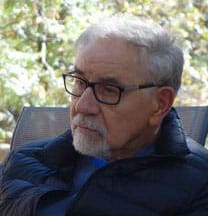“Who here is Jewish?” Kasim Hafeez asked the audience. Nearly all of the several hundred raised their hands. “Seven years ago,” he added, “I would have wanted to see all of you dead.”
The audience knew where this was heading, which didn’t make his words any less startling. Hafeez, 28, a British-born Muslim of Pakistani descent, grew up in Nottingham, England, and quickly added that now, seven years after his youthful fling with violent jihad, he stands firmly with Israel.
He spoke at the annual StandWithUs (SWU) “Israel in Focus” conference, sponsored by Gila and Adam Milstein. SWU, an Israel-advocacy group headquartered in Los Angeles, held the gathering at Santa Monica’s Sheraton Delfina hotel Nov. 9-11, and it included talks about ways to advocate for Israel.
Funny, articulate and self-assured, speaking without notes, Hafeez talked about his early years in a Pakistani neighborhood in England. “In my house, there was always mistrust of Jews and Israel,” he said. “The attitude was: ‘Jews are always up to something …’ My father was blatant about it. ‘Hitler was a good man. He didn’t go far enough; he didn’t kill enough Jews.’”
It was similar in the community, Hafeez said. “I remember, as a kid, holding up signs saying: ‘How can we help our brothers in Palestine?’”
By the time he was 16, in 2000, Hafeez said he had become “radicalized.”
“There was no question that America and Israel were guilty of all crimes, they were the doers of evil. … When you’re radicalized like that, that’s what you become. Them versus us,” he said.
“My most radicalizing experience was attending a British university. The level of propaganda was insane.” Hafeez attended a group purporting to show students how to be “better Muslims.” It was all about extreme anti-Israel propaganda. “At university, you’re surrounded by people who constantly demonize Jews. … You couldn’t say you were anti-Semitic, which is what it was. But being anti-Zionist was cool.”
One day, at a bookstore, Hafeez came across Alan Dershowitz’s book “The Case for Israel.” He read it with the idea that he would refute all the points. Instead, he found a lot of his deeply held feelings about Israel called into question. Confused, Hafeez decided to find out for himself whether Israel was an apartheid state, as he had always believed. He flew to Israel.
Carrying a recently renewed British passport (unmarked by visas), Hafeez was asked by security at Ben-Gurion Airport what countries he’d been to recently. He said: Pakistan and Saudi Arabia. The security person asked: Why have you come to Israel? Hafeez was truthful: He said he used to be anti-Semitic and anti-Zionist, but now he wanted to see the country for himself.
“So I spent the next eight hours with a security person,” he said. “He treated me very well, bringing me coffee and things to eat. We became almost like family.” When the security person finally let Hafeez enter the country, he offered some advice: “‘Next time you’re asked why you came to Israel, tell them you’re on holiday.’ ”
Hafeez walked around Jerusalem looking for signs of apartheid and didn’t see any. “This was not what I expected. I spoke with Muslims; I’d ask them how it was for them. They’d say, ‘We love it here; this is our home.’”
He went to the Holy Sepulcher, Al-Aqsa … then to the Western Wall.
“I thought: ‘Am I allowed here?’ Well, I was, of course. I was even approached by Chabadniks wanting me to lay tefillin. I thought to myself: ‘What am I doing here? Am I supposed to pray?’
“I put out a hand to touch the stones, to see what would happen. Then, slowly, I put my forehead on the stones. Then I looked around and saw the Israeli flag, and I thought: Here I am, at the spiritual center of the Israeli state. I looked at that flag and thought: There are 6 million people, 6 million Jews, who never got to see and touch these stones. No matter what happens, no matter what peace agreements are made, what treaties, what progress, there are 6 million who will never get the chance to do what I’m doing right now.”
Hafeez realized that Israel is about survival. “It struck me with such resonance. This is your home. … How hypocritical it had been of me to deny Israelis their homeland.”
When Hafeez returned to England, he felt he could either get back to life as it was or do something about what he’d learned. He’s been a pro-Israel activist in Great Britain ever since.
A student in the audience asked, “How do you get along with your family now?”
“My dad and I have nothing to do with one another,” Hafeez said. “My mom ignores the changes I’ve gone through. My sister and auntie are supportive. I even gave them IDF [Israel Defense Forces] scarves, which they wear.”
Asked how he became involved with speaking on the topic, Hafeez responded, “I called SWU and they arranged for me to talk on campuses, gave me tools and resources and information.”
Wrapping up his hour-long presentation, Hafeez said: “If someone says libelous things about Israel and no one responds, the other side considers it a victory. Don’t be ashamed of supporting Israel. It’s a wonderful country. Be proud of it. I figure that if I can change the attitude of just one person, I’ll have done some good. It’s terrible to live with hatred, especially hatred that’s so misplaced. If someone’s been indoctrinated, maybe one little fact might begin to change things, might cause a small crack in that shell.”























 More news and opinions than at a Shabbat dinner, right in your inbox.
More news and opinions than at a Shabbat dinner, right in your inbox.